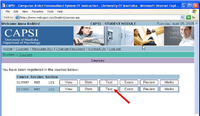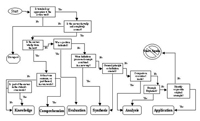
|
CAPSI Development
Team
Joseph
J. Pear,
PhD
I began using PSI early in
my university teaching career. When computers started to become
more widely available, it occurred to me that computerizing
my teaching procedure could relieve me of much of the administrative
burden of using PSI. In addition, because the computer can
store all tests, answers, and feedback in a courses, the course
data would be permanently available for any type of analysis.
This would make it possible to combine my teaching and research
in a most interesting way. My courses could become a laboratory
for the study of thinking and how we can teach it better in
our courses.
|
|
|
Darlene
E. Crone-Todd,
PhD
I have benefitted from using
CAPSI as a student and as a teaching assistant at both the
undergraduate and graduate levels. Using CAPSI in my courses
for the past 7 years has allowed me to study the relationship
between student engagement, higher order thinking, and learning
in both online and hybrid communities. This work has been
done at the University of Manitoba and at Delta State University
in Mississippi. I plan to launch the use of CAPSI at Salem
State College in January.
|
 |
|
Jody
Lambert,
BA (Hons.)
Jody is a graduate student
in ABA at the University of Manitoba. She has been a capsi
researcher for the last 3 years, and has presented at local
and national conferences.
|
 |
|
Alejandra
Zaragoza Scherman,
M.A.
Alejandra is a Ph.D. student in Applied Behaviour Analysis,
has co-authored a number of publications in behaviour analytic
journals, and actively works as a research assistant on ABA-related
projects through the St. Amant Research Centre. She also teaches undergraduate behaviour modification and learning theory courses online using CAPSI, and supervises ongoing research projects involving CAPSI.
http://web.me.com/antiquisima/azs/intro.html
|
 |
|
Gabriel
Schnerch,
M.A.
Gabriel has co-authored on
posters presenting CAPSI research at local and international
conferences, and currently teaches undergraduate courses in
child development, behaviour modification, and the science
of learning at the University of Manitoba using CAPSI. He
is working on his PhD in clinical psychology and is exploring
student procrastination behaviour and pacing contingencies,
as well as exploring ways to better train peer-reviewers (student
proctors) in CAPSI-taught courses.
|
 |
|
Heather
Simister-Firth, B.A. (Hons.)
Heather has been involved
with numerous projects in the CAPSI lab over the years includeing
various posters and publications. Heather began in the CAPSI
lab during her 3rd year as an undergraduate and is now pursuing
a degree in Clinical Psychology with Joe Pear at the University
of Manitoba. She continues to be involved with the CAPSI lab
focusing her efforts primarly on grant developement. Heather
has also served as a teaching assistant and instructor for
various courses. Currently, she works as the behaviour analyst
for St. Amant's Community Living Stabilization Service.
|
 |
|
Heidi
Eyre, PhD
Darlene Crone-Todd introduced me
to CAPSI by when we were both junior faculty at Delta State
University. At Delta State I used CAPSI in my General Psychology
and Developmental Psychology courses and have collaborated
with Joe and Darlene on several CAPSI-related research projects.
I plan to continue using CAPSI in my Social Psychology, Experimental
Methods, and Behavior Modification courses at Jacksonville
State University. For more information, check out my JSU
faculty webpage.
|
 |
|
Kathleen
Silva,
PhD
I have used WebCAPSI as a tool to
help students learn the material necessary to participate
in the small, discussion-oriented classes offered at the University
of Redlands. Using WebCAPSI with my Sport Psychology course
gave students the structure and incentive to learn the material
and freed class time for active learning exercises related
to the subject matter. In Research Methods, WebCAPSI is helping
students become more effective writers.
|
 |
|
Francisco
Silva,
PhD
My first exposure to CAPSI
was in 1984 when I was an undergraduate at the University
of Manitoba. As a professor at the University of Redlands,
I have used WebCAPSI to help students learn the basics of
writing and expression in History and Systems of Psychology,
to better learn the material in the Psychology of Learning,
and to learn the content of a supplemental Educational Psychology
textbook whose content could not otherwise be covered during
classes. For more information about my teaching and research,
go to http://newton.uor.edu/FacultyFolder/Silva
|
 |
|
|













